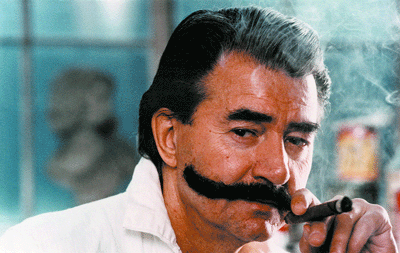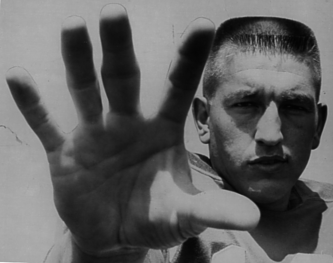The final episode The Night Of, HBO’s engrossing eight-part series co-created by Richard Price, airs this Sunday and if you have not been watching, have a little binge and catch up—you’ll dig it. Price is a distinguished novelist and screenwriter—I love the talk in movies like The Color of Money and Sea of Love—and one of my favorite Scorsese flicks, Life Lessons. Like many of us—thank you, P. Kael—he lost it at the movies. Back in December 1982, American Film magazine published Price’s charming essay about some of his favorite movie theater memories, and, with the author’s permission, we’re happy to now share it with you. Dive in, this will make you happy.—Alex Belth
“Gorgo, Warhol, Rocky, and Me”
By Richard Price
Over the marquee of a beat-up two-dollar movie house in Times Square, there’s an ancient faded sign: “Get More Out of Life—See a Movie.” The visual contrast between that sentiment and the desperate seediness surrounding it would yield, in its bitter irony, a photograph worthy of Walker Evans.
Nonetheless, the sign gives solid advice. Movies have always been a source of self-realization in my life; from Jerry Lewis to James Dean to Woody Allen, the shock of recognition has always signaled the Big Change for me.
But there’s another source of epiphany in a movie house, one much more profound and subtle than the screen—and that’s the audience. And I’ve always felt that the action in the seats was the greater teacher.
Rebel Without a Cause was pure bush-league in the life-lessons department compared with the ever popular torture of trying to worm a finger inside a steel-trap bra while keeping a two-hour, eyes-ahead poker face, or compared with the frantic in-crowd scrambling for who-sits-next-to-whom seating among a group of thirteen-year-old boys. Deep Throat was a rambling, flatulent dirty joke compared with the awesome sexuality of first tongue kiss while watching Topkapi. Psycho was so much “Mister Rogers” compared with the torture of sitting in front of six greaser cretins, who, after ordering you not to turn around, amused themselves through Viva La Vegas by treating your skull to sporadic slaps and buttered popcorn.
Everything—sex, power, kindness, cruelty, love lost and found—was acted out in the dark, no “The End,” and nothing could be exorcised by chanting, “It’s only a movie.”
The following memories are selected from my personal Book of Revelations.
1961—Growing Pains
GORGO
From the age of five to eleven, the highlight of my week was spending Saturdays with my grandmother, who lived in what is now known as the South Bronx. Our itinerary never varied: a double monster-movie matinee at one of the local theaters, dinner at a deli, and then back to her place for an evening of pro wrestling, roller derby, and “Zackerly’s Shock Theater” on the ole Emerson. But the crème de Ia crème was the monster-movie outing. She’d load up a shopping bag with sandwiches, fruit, and a few thermoses, and we’d head on out—nothing could be finer.
But it all began to fall apart two weeks before my twelfth birthday, when we went to see Gorgo.
Seated in the theater, surrounded by kids howling and yowling for the picture to start, my grandmother muttered her usual, “Animals,” a few times, jerking her head in annoyance to all points of the compass. One kid ten rows down from us got dragged out even before the lights dimmed. An eleven-year-old with a cigarette, dragged up the aisle by the tall, bony, gray-haired, tomahawk-faced matron in a white uniform like that of a school nurse, her eyes razors of determination, the kid trying desperately to be cool, trying to drag on his cigarette as he was hustled by his neck and armpit out of the theater, his friends laughing and whooing in a wolf chorus: “Efram, man, she too bad for you.” “Bite her, man.”
My grandmother squinted in admiration at the matron. “She’s a tough one.”
The kids were my age, but in every way it seemed like no contest; they were bigger, badder, louder, definitely not College Bound. As the matron came back down the aisle slightly huffing, my grandmother nodded to her. The matron smiled back a “How are you, dear,” then continued down to Efram’s friends brandishing her flashlight like a nightstick: “An’ if I see anybody else light up a cigarette, ya’s gonna get the same treatment.” That got a chorus of “whoos” as she tromped up the aisle, her face in an “I ain’t kiddin’” expression.
“Watch ’em,” my grandmother murmured. “I see two packs… these little bastards… just let ’em light up… they don’t think anybody’s watchin’.”
Halfway through Gorgo, while a mother dinosaur destroyed London in a search for her baby, one kid bent over the crotch of his friend for a light and both of us caught the brief orange flare reflected off the seat back in front of him.
She grabbed my arm. “We got him!”
The kid sat back in a low slouch, casually checking out his sides, the cigarette cupped inside his palm, lit end between his legs.
“Go get the matron!” my grandmother said, her eyes widening. I hesitated, not wanting to rat on another kid and not wanting to get beaten up. “Go, go! He’s almost finished!”
The matron was lounging against an archway, arms folded across her waist, eyes scanning the crowd. “Excuse me, miss? My grandmother wants to talk to you.”
She tromped down to our seats and bent over my grandmother, who didn’t say a word, just raised her eyebrows, made a slight motion with her head in the direction of that row of kids, and pressed two fingers against her lips as if she were dragging on a butt.
I saw all this from where the matron had been standing. I knew there was a chance that she would hustle this kid past me, that the kid would get a good look at me, and that maybe my ass was grass, but I didn’t really feel that worried. What I felt, more than fear was deep sorrow. For the first time in six years of movie outings with my grandmother, I found myself wishing I was one of her “animals,” wishing that I was sitting right in the middle of those kids, cupping a passed butt, taking a drag, and passing it on.
Much to my relief, the matron decided to lay off. When I sat back down, my grandmother was sitting hand to mouth, eyes wide, staring down at those kids. “Oh, honey, what a world,” she whisper-moaned, shaking her head behind her fist. “What a world…”
For the next several hours, I ate, she drank black coffee, too aggravated to eat, and we watched the kids. Every time one would come up the aisle to go to the john or get candy we would stare at him until our heads were almost completely turned around. We would do the same when he came back down. And we watched the movie. It struck me that my grandmother was a very lonely person and that in the very near future she would get a lot more lonely.
When we got out, it was twilight. The kids streamed around us, my grandmother’s tottering, arthritic bulk like a rock splitting rapids. One kid locked eyes with her, caught her death-ray sneer, and nudged his friend. My heart stopped. I envisioned my grandmother and me back to back fighting them off, but nothing happened, and I wound up watching them bop down the street, counting how many of them wore Keds and how many Converse.
1963—Studsmanship
THE DAY MARS INVADED EARTH
When we were all thirteen years old, my friends and I would go see any film anywhere at any time. We didn’t go to watch, we went to hunt. We knew that in every movie crowd there was at least one eighth-grade girl just sitting there waiting to put out. We’d go in, take a row, hiss, elbow each other, and snigger for two hours, then head on home calling each other faggots.
Everybody was pretty happy with the arrangement, but during Christmas break, early 1963, things were thrown into chaos at a neighborhood kiddie matinee of The Day Mars Invaded Earth.
Surrounded by seven-year-olds, we scoured the darkness, muttered variations on “I was up for it, too, man” and settled in for a few hours of wisecracks. At some point during the first hour of the movie, I was lurching down the aisle on my way back from a popcorn run when I heard someone hissing out my name. It was my main man, Howie, who, obviously out of his mind, was sitting in between two teenage girls. Giving me a look like he was sinking in quicksand, he said, “Hey, yo’, this is Jackie; she thinks you’re cute.”
Too freaked to think up an out for myself, I took the offered seat and concentrated on the movie. I had never wanted to be sitting next to a guy so badly as I did at that moment. The other girl was Jackie’s sister, Carol. Like the sluts they obviously were, they both had plucked eyebrows and more eye makeup than Cleopatra.
After a debonair half-hour pause to show her I was no beggar, I draped my hand along the back of Jackie’s seat and caressed Howie’s similarly outstretched arm. Howie responded by diddling the hollow of my elbow. I was in stud heaven for fifteen minutes before I glanced down and saw that both of Jackie’s hands were in her lap. Whipping my arm away from Howie’s like it was touching something with teeth, I sat reeling in retroactive revulsion, then made my move. I scored waist right off the bat. After what seemed like days later I made it up to the edge of her bra. Suddenly she hunched over and drawled out, “Hey Carol! I got another rib counter here.”
Carol had a look on her face as though she was at the end of a line at the Motor Vehicles Bureau; Howie was sitting there with his hands tucked in his armpits.
Turning back to me, Jackie grabbed my hand and planted it on her small left breast. My forehead tingled like a tuning fork. Now what? My hand lay on top of her sweater inert and splayed like a starfish until Jackie got up, gave her sister the high sign, announced a trip to the bathroom, took her umbrella and shoulder bag, and vanished forever.
When we all got outside, Howie bolted for a cab and rode alone the three blocks back to his house.
I walked home like Moses returning from a conversation with the Burning Bush. Oblivious to the frantic six-man press conference that circled me from the theater to my building, I was obsessed with trying to keep my wrist curled and my fingers spread in “the exact shape of Jackie’s breast. It had taken thirteen years for me to score, and, fearing that it would be another thirteen before I saw some action again, I felt that I had to preserve the mold of my conquest to tide me over the years.
But by the time I got inside my apartment, my hand was killing me. I began to panic. My first thought was to trace it on paper. Photograph it. Plaster of Paris. Luckily it was too late by the time I noticed the baby shoes on top of the family television. Before I realized that I could have bronzed it, my cramped hand had become unbearable and I had shaken it out.
1964—Career Counseling
THE T.A.M.I. SHOW
The T.A.M.I. Show was a rock concert filmed in 1964, at the dawn of the British invasion and the California sound. It was also the epitome of the racially integrated rock show, an amazing mix of three worlds—White America, Black America, and Liverpool—your hosts, Jan and Dean.
I saw The T.A.M.I. Show with three friends and our girls, all of us fifteen years old. My girl friend didn’t really love me, but in our crowd, if you weren’t part of a match, you might as well have a bell around your neck, and I was the only guy available. Unfortunately for me, I loved her madly.
All through Lesley Gore, the Supremes, Gerry and the Pacemakers, I sat there in the Saturday-matinee darkness totally focused on Mary’s hand, which lay in mine like it was carved from wax. Everybody around me was screaming and bouncing, and it pissed me off. I hated surfing music. I hated the British sound. And although I loved Motown, not even the synchronized svelteness of the Miracles could pull me away from agonizing over the implications of Mannequin Hand.
But suddenly, without warning, James Brown came flying across the screen, shrieking like he was on fire, and, without thinking, I found myself standing in a half crouch, pulling Mary’s hand over her head. Backed up by the Famous Flames, he seemed like the Devil in a doo, screeching and doing splits in celebration of his own bad-ass status. I’d never seen such a ferocious refusal to compromise, to “make nice,” and for twenty minutes he turned the world into something best seen from the portal of a Sherman tank.
The crowd was enjoying his set, but with a slight pall of wariness and detachment. There were no teen screams for “Please, Please, Please” or “Night Train” as there had been for “It’s My Party” or “Ferry Cross the Mersey.” James Brown was definitely not cute; no fantasy escort for a sweet sixteen. I felt as if all through the movie I had been at odds with the crowd and now we had just passed each other again. My girl friend stared at the screen like she was being forced to watch a massacre. She pulled her hand out of mine and crossed her arms in front of her chest. To hell with her.
At fifteen I had already established myself around school as a poet, but I was more into the wrapping than the gift. I wrote poems because it made my run-of-the-mill adolescent mooniness seem romantic and intriguing, elevated me from loner to lone wolf. Persona was everything because, allegedly, girls are suckers for uniforms.
But James Brown was a true outlaw artist, and sitting there watching him crooning and yowling, tearing up the boards with the smoking intensity of a flamenco dancer, face twisting and writhing into a catalog of passions, I found myself exhilarated by the making of art rather than the posing of the artist.
Walking out of the theater at two-thirty in the afternoon, I was astonished that it was still daylight.
I still wanted “poet” to shelter me from Mary’s coolness, still wanted “artiste” to rationalize my lovesickness as part of the forging process, but as I walked home, filled with the sights and sounds of James Brown, for the first time in my life I found myself wondering if I had any talent.
1970—Being in Love Means Never Having to Sit Through Andy Warhol
TRASH
During the late sixties and early seventies, my college years, movies were divided into two categories: “Amerikan propaganda” and “surreal.” Any movie where the cowboys, the cavalry, or the GIs won the battle was Fascist and sinister. Same for anything heartwarming or corny—all “part of the problem.” Surreal became synonymous with Good: Fantasia,Betty Boop cartoons, Medium Cool, Easy Rider, Zabriskie Point, the Marx Brothers, W.C. Fields, Bergman, Putney Swope, Mickey One,anything low-budget or starring mainly unknowns or shot in black and white—all surreal, all good.
I saw all the required movies, in part because I was enjoying my new role as a hippie aesthete, but also because I was a devout believer in “no pain, no gain”—Sugar Pops tasted better, but oatmeal made you strong. Outside of the hip comedies, most of what I found myself buying tickets for seemed to me boring, pompous, or just plain incoherent. In my heart of hearts I was still a Sands of Iwo Jima junkie, but I restrained myself for the good of the Movement.
When I was a junior, I had a first date with a coed whom I didn’t know if I really liked or not. Date meant movie. Our choices were The Good, the Bad, and the Ugly, Nazi Sex Crimes in Third Reich Love Camp Number Seven, Slaves,and Andy Warhol’s Trash.
Five minutes into Trash I felt myself going into a coma. In the first forty-five minutes I left to go to the bathroom three times. I would have died before admitting I was stupefied with boredom. I wouldn’t even turn to my date for fear that she would see my eyes rolling up into my head. An hour into the flick she touched my arm and asked me what time The Good, the Bad, and the Ugly started. I was embarrassed to know, but when I told her she looked at her watch and said, “That’s in five minutes; if we run we can make it.”
I said, “This is starting to mesh,” nodding toward the screen, amazed at my own cowardice.
She sighed and whispered in my ear. “Last year I was handing out flyers for a student-worker alliance rally at some construction site in New York. Some Puerto Rican guy in a hard hat—we’re talking prime-target minority labor here—he took the flyer, read it, and gave it back to me. He said, ‘If you don’t like it here, go back to Great Neck.’ Now we have only three minutes to make it.”
Two blocks into our dead run for the Strand I was in love.
1976—Just One of the Boys
ROCKY
In 1976 I had my own apartment. Being a self-supporting writer and having just finished a novel, I found myself with too much free time on my hands. It was a restless, boring time for me, and I filled in a number of empty afternoons by going alone to the movies. These solo excursions didn’t bother me, because I didn’t really consider myself a lonely person. I rarely had dinner alone.
But I always hated seeing other people sitting in the dark by themselves. Anybody, young or old, three-piece suits or babushkas. I could account for my own circumstances, but I always saw the others as tragic loners, destitute hearts doomed to a life of Chock Full O’Nuts counters.
On one Tuesday morning a few months into my “fallow” period, I woke up with a bad case of the Gregor Samsas. I felt lethargic and aimless; the refrigerator was stocked, the rugs vacuumed, the roaches in temporary retreat. I had nothing to do and the day yawned open ahead of me like a stretch of Kansas highway. A movie day if there ever was one.
I went downtown to see what all the hoopla was about with Rocky. I was supposed to go to the movies that evening with a girl friend, but I knew she’d rather see Scenes From a Marriage minus the subtitles than submit to two hours of Meatball Ascending.
From the moment I sat down in the half-empty theater I knew I was in trouble. I found myself surrounded by lone men, and from the screen credits on, my attention kept shifting from Rocky to the 3-D sad sacks in the seats, all of whom seemed to be perfectly self-contained and enjoying the show. Nonetheless my heart went out to them.
Whenever I concentrated on the movie, I found myself getting hot eyes and golf-ball throat at the most embarrassingly inane moments: Rocky not having the heart to break a longshoreman’s thumbs, Rocky doing push-ups, Adrian slaving over kitty litter in the pet store. It wasn’t Rocky,it was all those guys around me, kicking my ass with their painful solitude.
And then the whole thing blew up in my face.
During the final round of the climactic fight, when Rocky and Apollo Creed were pounding each other to pizza, the Bill Conti score pulsing with Rocky’s superhuman efforts, the audience lost control and people started yelling and cheering for the Italian Stallion, egging him on; a few were on their feet ducking and weaving and throwing punches at the screen. Suddenly, the guy to my left, an enormously fat black man nursing a tub of popcorn, belted out, “For God’s sake, Rocky, you can do it,” his cheeks slick with tears. My first reaction was shock that he wasn’t rooting for the black fighter.
Embarrassed by his outburst, the fat man looked around to see if anybody was laughing at him. When he turned in my direction, I was waiting for him with a commiserating basset-hound face, but when our eyes met, the contact was more than I had bargained for. Neither of us could turn away. We sat there, entranced with each other’s grief, pop-eyed, our mouths working wordlessly like beached fish; then we simultaneously burst out crying. Afraid that he would offer me some popcorn, I bolted from the theater.
Two weeks later, I moved into a huge apartment, splitting the rent with three roommates.
1979—What Ralph Ellison Meant by “Invisible Man”
THE ONION FIELD
AII my life I’ve gone to movies in the Times Square area. The crowds are ethnic mix ’n’ match, the fare usually critical crap, but the action is nonstop. If the movie is going over, the house is pure empathic Sensurround; if it’s a dud, everybody just turns to each other for their five dollars’ worth. People bring in grass, radios, babies, and portable televisions. There are always a half-dozen flakes arguing with the screen and another bunch who have no idea where they are. For years I saw that scene as a major goof; I was proud of my ability to feel at ease in any movie crowd in New York, from the Gold Coast theaters near Bloomingdale’s to the two-dollar roach sanctuaries on Forty-second Street. Mister Manhattan..
One evening I went down to Times Square to see The Onion Field. It was a Friday night and the house was packed. I could have caught the movie in the Village or on the Upper West Side, but I wasn’t in the mood to sit there with people who might applaud cinematography credits. I wanted audience juice.
At first the crowd started out with the usual woofing and cackling, goofing on everything from John Savage’s glasses to Ted Danson’s bagpipes, but as the focus shifted to the relationship between the two cop killers, white James Woods and black Franklyn Seales, the party mood began to fade. Woods played a cool and domineering psychopathic con man, Seales a quivering, spineless petty thief, and every scene between them hammered home their master-slave relationship.
At first, the mainly black and Puerto Rican crowd responded with sullen silence, but after a particularly degrading exchange, someone lost control and yelled out, “Stand up for yourself, chump!” and the audience erupted, cursing out Seales. A spray of popcorn landed on the screen, but nobody laughed. No one cursed out Woods, like I expected. No one cared about the dead cop or John Savage’s slow breakdown. I was amazed at the fury around me, but I didn’t feel it in myself. I felt like a social scientist, an outsider. I realized I was surrounded by people who had no addresses, no childhoods, and no names for me. I was slumming. Always had been.
When the two killers came to trial, Seales finally rebelled. He started cursing out Woods—even tried to physically assault him, and the crowd cheered with humorless encouragement.
But the rebellion was short-lived. Once Seales got to jail, his lawyer informed him that unless he and Woods cooperated in court, they’d both end up in the gas chamber. Blubbering and shaking, Seales confronted Woods in the prison shower room to beg forgiveness, but Woods had his price, and as the black man slowly slid to his knees, the white man’s hand on the back of his neck, the crowd was on its feet shouting, “No!”—pleading and threatening.
A young black guy standing in front of me wearing a knit skullcap bellowed, “Be a man, you punk!” At the end of the scene he remained standing, heaving with outrage, staring’ wildly around the theater. He saw me sitting behind him, slouched down, my face partially obscured by my hand, and before sinking back into his seat, he glared at me and drawled, “You enjoying the show?”
* * * * *
And there are any number of Honorable Mentions:
◻︎ I was taken to see The Ten Commandments for my eighth birthday and experienced my first religious crisis when my father told me that not only was Charlton Heston just an actor playing Moses, but that the guy wasn’t even Jewish.
︎ Experienced another religious crisis years later when I found myself sitting through The Bible a second time just to see the Sodom and Gomorrah part again.
︎ Sat through three consecutive showings of Mean Streets one afternoon, then went home, rifled through a box of family photos, and started the first chapter of Bloodbrothers that same night.
︎ Realized that I was no longer part of the youth vanguard the day I found myself in a revival theater surrounded by a roomful of punky-looking kids cackling at the horrifically dated slang of Easy Rider and Woodstock.
︎ Saw a sneak preview of Bloodbrothers booed by a full house because everybody was expecting the sneak to be Superman.
But the strangest of all my movie house experiences had to be the night I sat in a huge theater and watched myself up on the screen in The Wanderers. I was on for two minutes, playing a lounge lizard in a bowling alley. I talked, I sneered, and I got strangled with my own tie.
Sitting there, I felt absolutely no connection between myself on the screen and myself in the audience; no excitement, embarrassment, anger, or giddiness. I became so unnerved by the numbness of it all that I had to turn my head away from the screen, and in an effort to come back into myself, I put all my energy into watching the crowd watching me.































